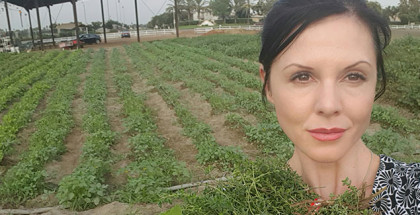Posts By AJ Hughes
Urban Aquaponic Farmer and Chef Redefines Local Food in Orange County, CA
March 7, 2016 | AJ Hughes
Heads of lettuce gain their sustenance through aquaponics channels at Future Foods Farms in Brea. Photo courtesy Barbie Wheatley/Future Foods Farms.
In a county named for its former abundance of orange groves, chef and farmer Adam Navidi is on the forefront of redefining local food and agriculture through his restaurant, farm, and catering business.
Navidi is executive chef of Oceans & Earth restaurant in Yorba Linda, runs Chef Adam Navidi Catering and operates Future Foods Farms in Brea, an organic aquaponic farm that comprises 25 acres and several greenhouses.
Navidi’s road to farming was shaped by one of his mentors, the late legendary chef Jean-Louis Palladin.
“Palladin said chefs would be known for their relationships with farmers,” Navidi says. Read More
New UC Riverside Enterprise Crosses Disciplines to Improve Local and Global Food Production Systems
February 24, 2016 | AJ Hughes
Participants at a California Agriculture and Food Enterprise planning workshop discuss its future goals and aims. (photo courtesy Don Davidson/University of California, Riverside)
With a strong emphasis on research, the California Agriculture and Food Enterprise (CAFE) at the University of California at Riverside has a mission to improve food production systems, stimulate food and agriculture teaching and develop an interdisciplinary food systems curriculum.
Drawing upon the expertise of faculty and staff from UCR’s College of Natural and Agricultural Sciences, University of California Extension and Agricultural Experiment Station, CAFE aims to link with people from other UCR colleges and departments who work in areas pertaining directly or indirectly to agriculture.
“[CAFE] transcends a single discipline,” says CAFE founder and genetics professor Norman Ellstrand. “People in social sciences are interested in food deserts.” Read More
Agriculture Key to California Economic Summit’s ‘One Million Challenge’ for Workers, Water and Homes
February 23, 2016 | AJ Hughes
Trees are pruned for backyard orchards at Hayes Valley Farm, a community-built farm on San Francisco’s former Central Freeway. Agriculture in both rural and urban areas is a key component of the California Economic Summit’s 2016 roadmap to economic prosperity. (Wikimedia Commons photo)
In November 2015, the fourth California Economic Summit took place in Ontario, located in Southern California’s Inland Empire. Agriculture was a key component of the vision outlined at the event, which is designed to spur economic growth in the Golden State.
The event is put on by the California Stewardship Network, a group promoting economic vitality and California Forward, a bipartisan government reform initiative.
“The first economic summit did not include agriculture, which was a large frustration,” says Glenda Humiston, vice president of University of California Agriculture and Natural Resources and co-lead of the Summit’s Working Landscapes Action Team along with A.G. Kawamura, an urban farmer from Orange County. “The following year, we advocated for a Working Landscapes action team.” Read More
L.A. Food Policy Council Outlines Path to Fresh Food for All in the City of Angels
February 17, 2016 | AJ Hughes
A blighted vacant lot is seen in Los Angeles. Through urban agriculture incentive zones, the Los Angeles Food Policy Council wants to see more vacant blighted land transformed into thriving urban farms and gardens. (Photo courtesy Camille de la Vega/Los Angeles Food Policy Council)
Imagine a world-class metropolis where people take their relationships with food so seriously that all citizens enjoy access to farmers’ markets. The notion of food waste is obsolete (instead, think food capital). Farms and gardens thrive where vacant lots once languished and the streets are alive with an astounding variety of food vendors.
That’s a vision that the Los Angeles Food Policy Council (LAFPC) is working hard to make a reality in the City of Angels. To make food access more equitable for all, LAFPC is stressing four equity initiatives which focus on urban agriculture incentive zones, sidewalk food vending, food waste recycling and compost, and accessible farmers’ markets. Read More
To Grow Movement, Riverside Chef Makes 100 Percent Fresh, Local Produce Menu’s Main Event
February 10, 2016 | AJ Hughes
Fresh local produce adds a mighty splash of color to the kitchen inside Health’s Kitchen restaurant in Riverside, California. (Photo courtesy Robin Meadows/Health’s Kitchen)
For some, the word “local” can be ambiguous. But Health’s Kitchen restaurant in Riverside, California, has strict rules regarding where it obtains its produce. Ideally, it must come from farms located in the City of Riverside, and when this isn’t possible, only Riverside County farms will suffice.
“Fresh produce is the main event on the menu,” says Health’s Kitchen co-owner Robin Meadows. “There are a few restaurants that obtain some of their food locally, but we get 100 percent of our produce from local farmers.” Read More
10 Beginning Farmer Training Programs Across the U.S. Focused on Sustainability
February 2, 2016 | AJ Hughes
Students at the Merry Lea sustainable farm in Indiana are seen working at the “kitchen farm”. (photo courtesy of Jon Zirkle/Merry Lea Environmental Learning Center)
The average age of American farmers is 58.3 years, according to the U.S. Census of Agriculture. Young farmers are needed, and those who are inexperienced have a variety of farmer training programs (many of them focusing on sustainability) to choose from.
- Oregon’s Rogue Farm Corps runs an internship program for beginning farmers called FarmsNext. This full-season offering trains new farmers and ranchers in sustainable agriculture. Those enrolled in the program gain up to 1,500 hours of hands-on training from a mentor, 75 hours of classroom time, local farm tours and independent study opportunities. Rogue Farm Corps runs four chapters across the state: Rogue Valley, South Willamette, Portland and Central Oregon. The organization was founded in 2003 by farmers in the southern part of the state who saw the need to provide education to those new to agriculture.
Congressman Mark Takano Works to Unleash Power of Agriculture for Riverside’s Health and Prosperity
February 1, 2016 | AJ Hughes
Congressman Mark Takano, whose district includes the City of Riverside, spoke at the 2014 GrowRIVERSIDE conference and is a champion of local and sustainable food and agriculture. (photo courtesy Josh Weisz/Office of Congressman Mark Takano)
Congressman Mark Takano, a Democrat from California’s 41st congressional district, was born in Riverside, California. The longtime Riverside Community College Board of Trustees member delivered a keynote address at GrowRIVERSIDE’s “Citrus and Beyond” conference in 2014, and he understands the importance of local sustainable agriculture to the economic prosperity of Riverside.
Seedstock caught up with Congressman Takano, who answered some of our questions:
Seedstock: What are your impressions on the pursuit of the development of local food system infrastructure in your district?
Takano: We’re making good progress, but there’s more work to do. The efforts of GrowRIVERSIDE are really encouraging and I was honored to be a keynote speaker at the GrowRIVERSIDE “Citrus and Beyond” conference. It really takes buy-in from consumers to get this kind of thing going and that’s what I’ve been seeing. Read More
Hub-to-school: Food Hubs and Schools in Vermont Work Together to Drive Localization of Food System
February 1, 2016 | AJ Hughes
Volunteers pose next to boxes of gleaned food, all destined for a Vermont food hub. Numerous food hubs in the state supply produce to schools. (Photo courtesy Abbey Willard/Vermont Agency of Agriculture, Food and Markets)
Food hubs and farm-to-school programs are essential mechanisms in increasing access to food produced locally and sustainably. In Vermont, an effort is underway to combine the power of both.
As the recipient of a USDA farm-to-school grant in 2013, the Vermont Agency of Agriculture, Food and Markets (VAAFM) produced a report titled “Using Food Hubs to Create Sustainable FTS (Farm-to-School) Programs.” It explores how to leverage “non-traditional resources to expand farm-to-School market relationships between Vermont’s schools and producers.”
The publication was released in March 2015, and now, more than nine months later, VAAFM local foods administrator Abbey Willard is pleased with its impact. Read More










